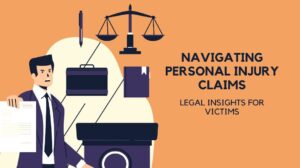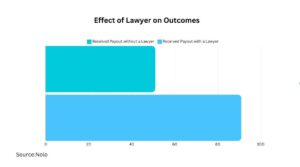
When you’re involved in an accident that leads to personal injury, navigating the legal system can be daunting. However, understanding the key steps and considerations can help you make informed decisions and maximize your chances of obtaining the compensation you deserve.
This comprehensive guide will walk you through the personal injury claim process, from the crucial initial actions to take after an accident, to the negotiation and settlement process, and what to expect if your case goes to trial. With the right guidance, you can emerge from this challenging experience with the resources and support you need to move forward.
Steps to Take Immediately After an Accident
The moments after being involved in an accident that leads to personal injury can be chaotic and overwhelming. However, taking the right steps immediately can significantly strengthen your future legal claim.
Here’s what you should do:
- Gather Evidence: Document the accident scene as thoroughly as possible. Take photos of any visible injuries, the surrounding area, and any property damage. Collect contact information from any witnesses who saw the incident occur.
- Seek Medical Attention: Obtain a professional medical evaluation, even if your injuries appear minor. This creates an official record of your condition and the extent of your injuries, which is crucial for your claim.
- Notify Relevant Parties: Report the accident to the appropriate authorities, such as the police or your insurance provider. Provide a detailed account of the incident while it is still fresh in your mind.
- Avoid Discussing Fault: It’s important not to admit fault or make any statements about the accident that could jeopardize your claim. Stick to the facts and avoid speculating about the cause or circumstances.
Taking these immediate steps lays the groundwork for a strong personal injury claim and protects your legal rights.
Key Considerations When Filing a Personal Injury Claim
Navigating the personal injury claim process can be complex, but understanding a few key considerations can help you make informed decisions.
Statute of Limitations
Every state has a statute of limitations, which is the time limit within which you must file a personal injury claim. These time frames can vary, so it’s crucial to familiarize yourself with the specific laws in your state, especially if you’re located in Columbia, SC. The statute of limitations for filing a personal injury lawsuit in South Carolina is three years. A personal injury lawyer in Columbia SC can ensure you file your claim within the statute of limitations, as failing to do so can result in your case being dismissed entirely.
Required Documentation
To build a compelling personal injury case, you’ll need to gather and provide various types of documentation, including:
- Medical records: This includes all documentation related to your injuries, treatment, and ongoing care.
- Insurance information: Details about any insurance policies that may cover the accident, such as auto, homeowner’s, or business insurance.
- Proof of lost wages: If your injuries have resulted in missed work and lost income, you’ll need to provide documentation to support this.
- Receipts for out-of-pocket expenses: Keep track of any expenses related to your accident and recovery, such as transportation, medical equipment, or home modifications.
Gathering and organizing this information can be time-consuming, but it’s an essential step in strengthening your claim.
The Role of Personal Injury Attorneys in Your Case
While it’s possible to navigate the personal injury claim process on your own, having an attorney on your side can make a significant difference in the outcome of your case.
Navigating Legal Complexities
Personal injury law is notoriously complex, comprising myriad rules, regulations, and legal procedures that can be daunting for the average person to navigate. A personal injury attorney can ensure that your claim is filed correctly and in a timely manner.
Negotiating with Insurance Companies
Insurance companies are often more interested in protecting their bottom line than fairly compensating injured parties. A personal injury attorney can effectively negotiate with insurers, using their knowledge to maximize the compensation you receive.
Advocating for Your Rights
Personal injury attorneys are passionate about protecting their clients’ rights. They will work tirelessly to ensure that your voice is heard and that you receive the justice and compensation you deserve.
Maximizing Compensation
Personal injury attorneys have a deep understanding of the monetary value of different types of injuries and the factors that can impact the potential payout. Personal injury compensation is their primary focus, and they can help you pursue the maximum amount available to you, taking into account lost wages, medical expenses, and other damages.

Source: Nolo
Overview of the Negotiation and Settlement Process
Once you’ve filed your personal injury claim, the negotiation and settlement process begins. This is where the assistance of a personal injury attorney can be invaluable.
Negotiation Strategies
Personal injury attorneys are skilled negotiators who understand the tactics used by insurance companies to minimize payouts. They will work to present a compelling case that highlights the full extent of your injuries and damages, making it difficult for the insurance company to lowball you.
Avoiding Early Settlement Offers
Insurance companies may quickly offer a settlement, but these initial offers are often far below what you’re entitled to receive. It’s crucial to resist the temptation to accept an early offer without first consulting with an attorney, as they can help you determine the true value of your claim.
Reaching a Fair Settlement
Through careful negotiation and a steadfast commitment to your best interests, a personal injury attorney will work to secure a settlement that adequately compensates you for your injuries, lost wages, and other damages. This can be a delicate and complex process, but an attorney will be your advocate every step of the way.
What to Expect If Your Case Goes to Trial
While more than 90% of personal injury cases are settled out of court, there are instances where a trial becomes necessary. If your case does go to trial, here’s what you can expect:
The Role of a Jury
In a personal injury trial, a jury is responsible for determining liability and the amount of damages to be awarded. Your personal injury attorney will work to present your case in a clear and compelling manner, highlighting the evidence and testimony that supports your claims.
Presenting Evidence
During the trial, both sides will have the opportunity to present evidence, including medical records, witness statements, and expert testimony. Your attorney will work to ensure that all relevant evidence is properly introduced and considered by the jury.
The Duration of a Trial
The length of a personal injury trial can vary significantly, depending on the complexity of the case and the amount of evidence that needs to be presented. Some trials may last a few days, while others can stretch on for weeks or even months.
Preparing for the Unexpected
Even with the best representation, the outcome of a trial can be unpredictable. Your personal injury attorney will work to anticipate and prepare for any potential challenges or surprises that may arise during the proceedings.
Financial Considerations and Attorney Fees
One of the primary concerns for many personal injury victims is the financial aspect of the legal process. Fortunately, most personal injury attorneys work on a contingency fee basis, which means they only get paid if you receive a settlement or verdict.
Contingency Fee Arrangements
Under a contingency fee agreement, your personal injury attorney will typically receive a percentage of your final settlement or award, usually ranging from 33% to 40%. This arrangement allows you to access high-quality legal representation without having to pay any upfront fees.
Costs and Expenses
In addition to the contingency fee, there may be other costs and expenses associated with your case, such as court filing fees, expert witness fees, and the cost of obtaining medical records. Your attorney will be transparent about these expenses and work to minimize them whenever possible.
Impact on Future Claims
It’s important to note that any settlement or verdict you receive may impact your eligibility for future insurance claims or government benefits. Injury claims can be complex, and your personal injury attorney can advise you on how to navigate these considerations and ensure that your best interests are protected.
After the Settlement or Verdict: Next Steps
Once your personal injury case has been resolved, either through a settlement or a court verdict, there are a few important steps to take.
Receiving Your Settlement Checks
If a settlement is reached, your attorney will ensure that the insurance company or responsible party issues the settlement checks to you and your legal representation. This process can take several weeks or months, depending on the complexity of the case.
Paying Attorney Fees and Expenses
Your personal injury attorney will deduct their agreed-upon contingency fee, as well as any outstanding expenses, from the settlement amount. The remaining funds will then be disbursed to you.
Considering Future Insurance Claims
It’s important to be mindful that any settlement or verdict you receive may impact your ability to make future insurance claims, as it could be seen as a pre-existing condition. Your attorney can advise you on how to navigate these considerations.
Moving Forward with Your Life
With the legal process behind you, you can focus on your continued recovery and rehabilitation. Remember to prioritize your physical and emotional well-being, and seek any necessary support or resources to help you move forward.
Potential Pitfalls and How to Avoid Them
While navigating the personal injury claim process, there are several potential pitfalls to be aware of. By understanding and avoiding these common mistakes, you can help ensure the success of your claim.
Posting on Social Media
Be extremely cautious about what you post on social media platforms, as insurance companies may use any information or images to try to undermine your claim.
Ignoring Medical Advice
It’s crucial to follow your healthcare provider’s instructions and attend all recommended appointments. Failure to do so can be used against you, as it may suggest that your injuries are not as severe as you’ve claimed.
Delaying Medical Treatment
Seek medical attention as soon as possible after an accident, even if your injuries don’t seem severe. Waiting to receive treatment can make it more difficult to establish a direct link between the accident and your injuries.
Failing to Document Expenses
Keep meticulous records of all expenses related to your accident and recovery, including medical bills, lost wages, and any out-of-pocket costs. This documentation will be essential in supporting your claim for damages.
Accepting an Early Settlement Offer
As mentioned earlier, it’s important to resist the temptation to accept an early settlement offer from an insurance company without first consulting with an attorney. These initial offers are often far below what you’re entitled to.
By being aware of these potential pitfalls and taking proactive steps to avoid them, you can increase the likelihood of a successful personal injury claim.
In Conclusion
Navigating the personal injury claim process can be a daunting task, but with the right guidance and a clear understanding of the key steps and considerations, you can maximize your chances of obtaining the compensation you deserve.
Remember, time is of the essence, so act quickly to preserve evidence and protect your legal rights. Seek the assistance of a personal injury attorney who can help you navigate the complexities of the legal system and ensure that your voice is heard.
With the right representation and a commitment to your own well-being, you can emerge from this challenging experience with the resources and support you need to move forward with your life.
FAQs
1. How long does it take to settle a personal injury claim?
The timeline varies widely, from a few months to over a year, depending on the case complexity and cooperation of parties. Your attorney can provide an accurate timeline.
2. What are the chances my case will go to trial?
Most (around 95%) personal injury cases settle out of court. Factors like disputed liability and insurance company unwillingness to settle can increase the chances of trial. Your attorney can assess your specific case.
3. Can I get compensation if I was partially at fault?
Yes, the legal doctrine of comparative negligence allows recovery, but the compensation is reduced by your degree of fault. Discuss your case with an attorney, as state laws vary.



